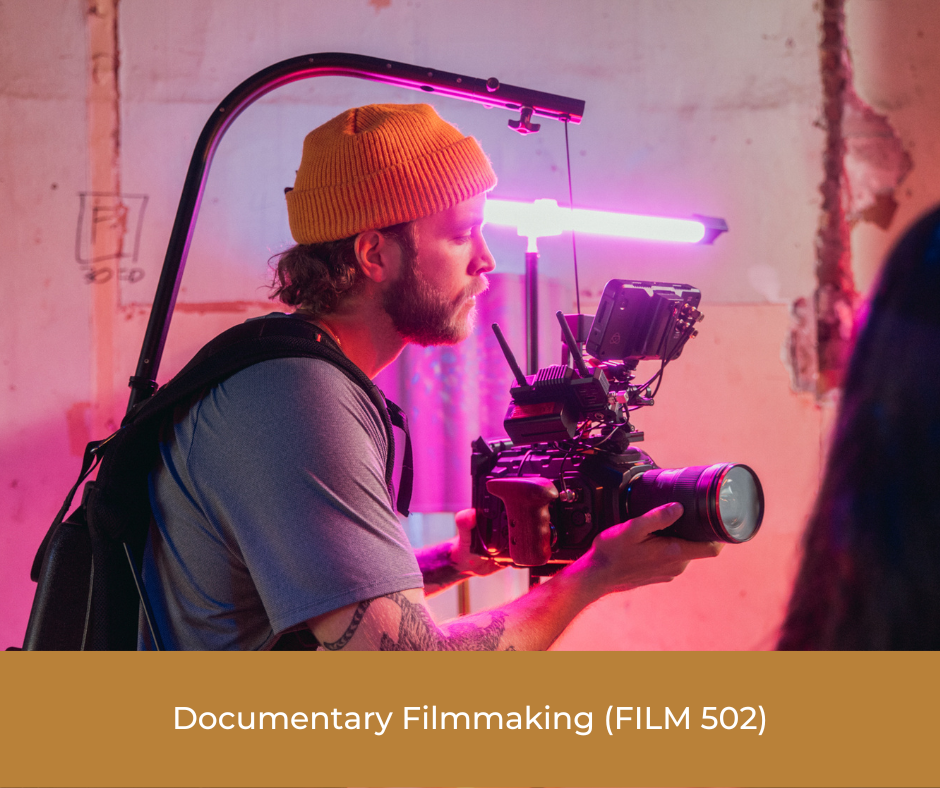Your cart is currently empty!
Documentary Filmmaking (FILM 502)

“FILM 502: Documentary Filmmaking” is an immersive course that explores the art and craft of creating compelling documentaries. This course guides students through the entire documentary production process, from researching and planning to shooting and editing. Students will learn to tell real-world stories effectively through the medium of film.
Outline of Major Content Areas:
- Introduction to Documentary Filmmaking: An overview of the documentary filmmaking genre, its history, and its significance in portraying real-life stories.
- Research and Story Development: Techniques for researching and developing documentary concepts, including selecting compelling subjects and defining storytelling objectives.
- Pre-production Planning: Detailed pre-production processes, such as budgeting, scheduling, securing locations, and assembling a production team.
- Cinematography for Documentaries: Cinematic techniques specific to documentary filmmaking, including shot selection, framing, and capturing real-life events.
- Interview Techniques: Strategies for conducting effective interviews, crafting questions, and eliciting meaningful responses from subjects.
- Documentary Ethics: Exploring ethical considerations in documentary filmmaking, including informed consent, privacy, and objectivity.
- Documentary Directing: The role of the director in guiding the documentary’s narrative, style, and tone.
- Editing and Post-Production: Techniques for editing documentary footage, including storytelling through montage, sound design, and the integration of interviews and B-roll.
- Narrative Structure: Crafting compelling narrative structures for documentaries, including linear, non-linear, and thematic approaches.
- Documentary Styles and Subgenres: Exploration of various documentary styles and subgenres, such as observational, participatory, and advocacy documentaries.
- Documentary Distribution and Impact: Understanding the distribution channels for documentaries, film festivals, online platforms, and strategies for maximizing the impact of the documentary.
- Documentary Film Analysis: Analyzing and critiquing acclaimed documentary films to gain insights into effective storytelling techniques.
Course Learning Outcomes:
Upon completing FILM 502, students will:
- Conceptualization: Develop a clear and engaging documentary concept, supported by thorough research.
- Pre-production Proficiency: Demonstrate competence in budgeting, scheduling, and planning for documentary production.
- Cinematic Techniques: Apply cinematographic techniques specifically suited for documentary filmmaking.
- Effective Interviewing: Conduct compelling interviews that yield meaningful content for the documentary.
- Ethical Considerations: Navigate ethical considerations inherent in documentary filmmaking.
- Editing Mastery: Edit documentary footage effectively, crafting a compelling narrative through post-production techniques.
- Narrative Crafting: Create engaging narrative structures for documentaries.
- Style Adaptation: Adapt to various documentary styles and subgenres, choosing the most appropriate for a given subject.
- Distribution Knowledge: Understand documentary distribution channels and strategies for maximizing impact.
- Film Analysis Skills: Analyze and critique documentary films to gain insights into effective storytelling.
Methods for Assessing Student Learning:
Assessment in FILM 502 focuses on evaluating students’ proficiency in documentary filmmaking:
- Documentary Concept and Research: Assessment of students’ documentary concepts, including the depth of research and storytelling potential.
- Pre-production Planning and Budgeting: Evaluation of students’ pre-production plans, including budgets and schedules.
- Cinematic Techniques: Assessment of students’ ability to apply documentary-specific cinematographic techniques.
- Interviewing Skills: Evaluation of students’ interview techniques and their ability to capture compelling content.
- Editing Proficiency: Assessment of students’ editing skills, including their ability to create a coherent and engaging narrative.
- Narrative Structure: Evaluation of the effectiveness of students’ narrative structures.
- Style Adaptation: Assessment of students’ capacity to adapt to different documentary styles and subgenres.
- Distribution Strategies: Evaluation of students’ understanding of documentary distribution channels and strategies.
- Film Analysis: Analysis and critique of documentary films, demonstrating students’ comprehension of effective storytelling techniques.
FILM 502 prepares students to excel in the art of documentary filmmaking, empowering them to create impactful and thought-provoking films that engage and inform audiences.